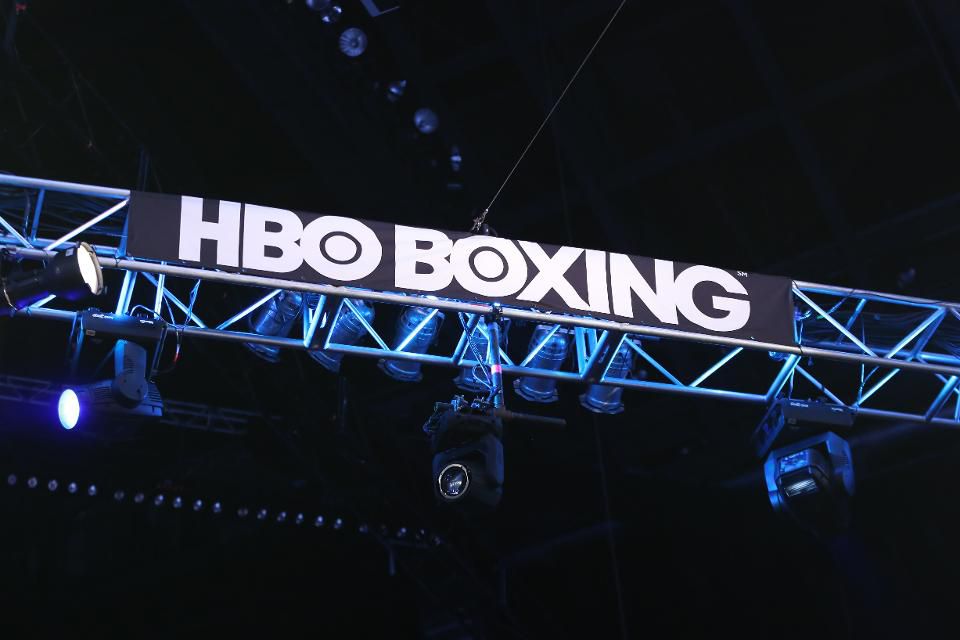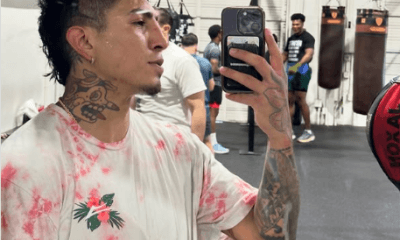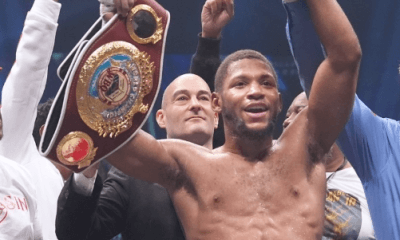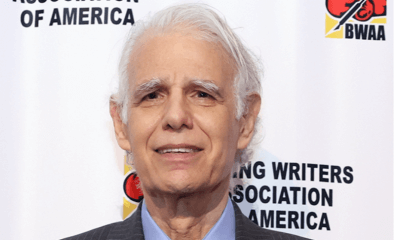Featured Articles
HBO’s Exit From Boxing More Proof That All Empires and Title Reigns Eventually End
Whoever first coined the phrase “All good things must come to an end” might have been talking about the 1,500-year run of the Roman Empire

Whoever first coined the phrase “All good things must come to an end” might have been talking about the 1,500-year run of the Roman Empire, the somewhat more abbreviated domination of Major League Baseball by the New York Yankees or the even shorter reigns of even the greatest and most enduring of boxing champions. But Thursday’s announcement that HBO would shut down its boxing operation by the end of 2018, after a mostly successful (if not so much lately) 45 years, nonetheless sparked multiple expressions of sadness while raising questions as to why and how such a thing could come to pass.
“There was a time when everything HBO Boxing touched turned to gold,” said promoter Lou DiBella, 58, founder and chief operating officer of DiBella Entertainment and a longtime senior vice president of HBO Sports until his departure in the fall of 2000. “I’m sad. This is like the Yankees going out of business in a way, in terms of a brand. HBO was the most powerful brand in televised boxing throughout the world, not just the United States. And now it’s going away. That’s pretty amazing.”
The same sentiment was more or less echoed by Larry Merchant, 87, the erudite former newspaperman who served as an analyst for HBO’s boxing telecasts until he left the premium-cable channel in December 2012.
“I was part of something that worked out well for me for 35 years,” Merchant said from his home in Santa Monica, Calif. “The way I try to put it is that we were once a good-looking prospect, then a challenger, a champion and a great and long-time champion. Then we were an ex-champion and a has-been who finally retired. All I can say is, `So long, champ.’”
HBO’s abdication – and that’s essentially what it is, the one-time “Heart and Soul of Boxing,” as it once billed itself, quitting on its stool at the same time that Showtime, Fox, ESPN and various streaming services are investing significant resources into the sport – hardly comes as a surprise to those who have been tracking its incrementally decreasing commitment in recent years. At the height of its involvement with the sweet science, with which it had become inextricably identified, HBO’s deep-pocketed, blow-the-competition-out-of-the-water approach came with an annual budget of $80 million for marketing and rights fees. But as its corporate identity changed (HBO and its parent company, Time Warner Inc., were acquired for $85.4 billion by AT&T Inc. in June), boxing’s place in the HBO lineup became less about the good old days and more about a diminishing bottom line.
“I don’t know, that’s above my pay level. I don’t work at HBO anymore,” Merchant said when asked why the plug was being pulled and what might have been done to prevent death by disinterest. “But just as (the new executives in charge) became hard-core numbers guys, where the original executives had a passion and a vision in their approach to boxing, things changed.
“They haven’t had many prime-time heavyweights from America for some time. The (ratings and income generated from boxing) have gone down. HBO is now a mature company, and the guys who care just about the numbers decided that boxing wasn’t popular enough to keep going. They were putting fractions – small fractions – of the money into it that they used to put into it.
“Today the real opposition for HBO is Netflix, Amazon Prime, Hulu and so on. The people in charge of HBO now are trying to see the future from the present, not the past. We’ll see if the paltry amount of money they were putting into boxing recently is put to better use elsewhere. But it is interesting that Fox comes in with some serious money, as is ESPN, Showtime and some streaming entities. Somebody obviously cares about boxing. Fox isn’t putting tens of millions of dollars into it because they don’t want to make money. They want to make money. So the sport, like water, will find its own level. It always has.”
The timing of HBO’s announcement, with a release from HBO Sports executive vice president Peter Nelson, 37, on the New York Times web site, is especially curious in light of the fact that it was largely obscured by the overriding national interest in the he-said, she-said testimony in Washington involving Supreme Court nominee Brett Kavanaugh and the woman who has accused him of sexual assault in an incident dating back 36 years to when both were in high school. One former HBO official, who asked not to be identified, called the timing of the announcement “cowardly,” comparing it to the massive television coverage of June 17, 1994, car chase involving football legend and accused killer O.J. Simpson. As untold millions of eyes followed the path of that now-infamous white Ford Bronco and its celebrity occupant, several important sports events going on that same day were basically overshadowed, including the New York Rangers’ Stanley Cup Parade, the World Cup Opening Ceremony, Game 5 of the World Series and Arnold Palmer’s final U.S. Open round.
“It’s sad to see it all go away by its own hand and their own decision-making,” DiBella said. “You would have loved to see them to go out on top, not with a whimper.”
Not that boxing on HBO started out on top, even if it’s first telecast, the Jan. 22, 1973, heavyweight title bout in Kingstown, Jamaica, in which George Foreman dethroned Joe Frazier on a brutal second-round stoppage that saw Smokin’ Joe floored six times, was an aesthetic success for action-craving fight fans. Many Americans were reluctant to take the leap of faith to pay extra to receive programming for access to a new phenomenon known as premium cable. When HBO officially launched on Nov. 8, 1972, the time between the movies that constituted the bulk of its programming was filled by video of a bicyclist’s ride through New York’s Central Park, the taped feed coming from a camera mounted on the handlebars. Hardly cutting-edge stuff.
Foreman, now 69, not only appeared as a boxer on HBO in both phases of his remarkable career, but as a color commentator. He said he was not surprised that HBO was bailing because the network had “used” boxing until it had served its purpose, and is now casting it aside as so many other media outlets have in the past.
“Joe Louis-Max Schmeling really made boxing on radio important,” Foreman opined. “The Gillette Cavalcade of Sports made boxing on television important in the 1950s and ’60s, as did ABC’s Wide World of Sports a little later on. HBO wasn’t really HBO until it started putting boxing on with me and Joe Frazier. That was the beginning of building something and making it extra-special.
“But whenever (those media outlets) make it on a bigger scale, what do they do? They drop boxing, which is a reason they got big in the first place. What’s happening now is nothing new. I’m surprised they just announced it.
“For years I traveled around the country and people told me, `George, I don’t really care that much about HBO, but because you’re on it, I’m going to buy it.’ They were probably saying the same thing to other fighters who were bringing (subscribers) to HBO. The (heavyweight unification) tournament with Mike Tyson really sealed the deal.”
Foreman cited former HBO Sports executive Michael Fuchs, who paid Tyson an almost-unthinkable $26.5 million to cover his appearances on the network for 1987 and ’88, as being an important factor in HBO’s emergence as the dominant force in TV boxing, as well as the golden era heyday of DiBella and former HBO Sports president Seth Abraham. They were as bottom-line conscious as their successors at HBO’s corporate headquarters, but they brought a passion to their work that some say has not been maintained at the same level. Business is business, but unbridled enthusiasm is an ingredient that is imperative to the success of any venture. The guys at the top of the boxing operation might have gotten the most credit for those decades of success, but they had a lot of help along the way.
“It’s sad because it’s the end of an era,” acclaimed former HBO Sports director Marc Payton, 69, said of HBO’s impending exit from boxing. “I’m sad for friends of mine that are still at HBO who will be affected by the loss of its boxing programming. For me it was an era that was an incredibly fun time. I was there for 35 years doing boxing and made a lot of great, lifelong friends and with whom I shared a lot of great memories.
“The economics of the business, such as the deal Top Rank recently cut with ESPN, I’m sure contributed to the decision on HBO’s part, as well as the loss of some of its marquee fighters which diminished the star value at the network. (HBO mainstays Canelo Alvarez and Gennady Golovkin became free agents with the conclusion of their Sept. 15 rematch, and another headliner, Sergey Kovalev, lost for the third time in his last five bouts when he was stopped in seven rounds by Eleider Alvarez on Aug. 4).
“We were the home of the stars for so long. We had Marvin Hagler, Sugar Ray Leonard, Evander Holyfield, Lennox Lewis, Riddick Bowe, Roy Jones, Oscar De La Hoya, Manny Pacquiao, Floyd Mayweather. We did the Arturo Gatti-Micky Ward trilogy, and Tyson from the time he was a young challenger to becoming a champion before he went to prison. We had them all!”
To date, HBO has televised 1,111 fights, an ironic figure indicative of its former No. 1 status in an industry that is proclaiming its continuing health by branching out and lapping up new revenue streams. Oh, there is one more event on the schedule, on Oct. 27 from the Hulu Theater at Madison Square Garden headlined by the scrap for the vacant IBF middleweight title between Daniel Jacobs and Sergey Derevyanchenko. There might be another farewell fight or two scheduled between then and the end of the year, but Foreman’s hope that boxing will again find its way back to HBO beyond then, and to any significant degree, appears to be wishful thinking. Like all love affairs, when it’s over, it’s over.
“To have the tremendous legacy and incredible history that HBO had … certain fights we did became the sport’s Super Bowls,” a reflective DiBella said. “Boxing on HBO was must-see programming as much as The Sopranos was must-see programming.”
But Tony Soprano is gone, as is the deceased actor who superbly played him, James Gandolfini. The king is dead, long live the king, whoever and whatever that is.
Bernard Fernandez is the retired boxing writer for the Philadelphia Daily News. He is a five-term former president of the Boxing Writers Association of America, an inductee into the Pennsylvania, New Jersey and Atlantic City Boxing Halls of Fame and the recipient of the Nat Fleischer Award for Excellence in Boxing Journalism and the Barney Nagler Award for Long and Meritorious Service to Boxing.
Check out more boxing news on video at The Boxing Channel
-

 Featured Articles3 weeks ago
Featured Articles3 weeks agoAvila Perspective, Chap. 330: Matchroom in New York plus the Latest on Canelo-Crawford
-

 Featured Articles2 weeks ago
Featured Articles2 weeks agoVito Mielnicki Jr Whitewashes Kamil Gardzielik Before the Home Folks in Newark
-

 Featured Articles4 weeks ago
Featured Articles4 weeks agoOpetaia and Nakatani Crush Overmatched Foes, Capping Off a Wild Boxing Weekend
-

 Featured Articles3 weeks ago
Featured Articles3 weeks agoCatching Up with Clay Moyle Who Talks About His Massive Collection of Boxing Books
-

 Featured Articles4 weeks ago
Featured Articles4 weeks agoFabio Wardley Comes from Behind to KO Justis Huni
-

 Featured Articles2 weeks ago
Featured Articles2 weeks agoMore Medals for Hawaii’s Patricio Family at the USA Boxing Summer Festival
-

 Featured Articles3 weeks ago
Featured Articles3 weeks agoThe Shafting of Blair “The Flair” Cobbs, a Familiar Thread in the Cruelest Sport
-

 Featured Articles3 weeks ago
Featured Articles3 weeks agoRichardson Hitchins Batters and Stops George Kambosos at Madison Square Garden


























